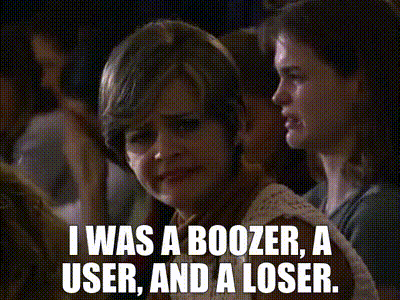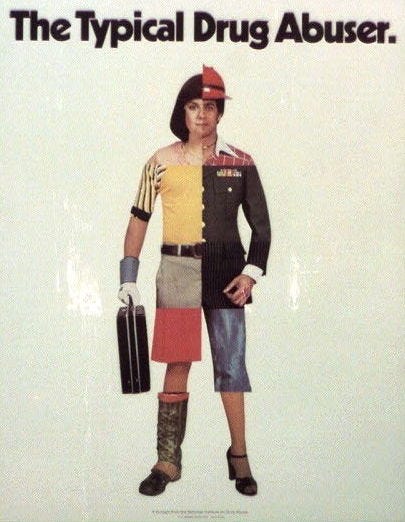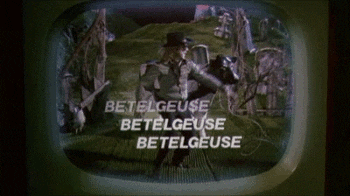The new Beetlejuice trailer just dropped. I guess someone said “Beetlejuice” three times again? Didn’t they learn the first time?
Sadly, we can’t summon demons by saying their names. But we can unconsciously internalize language that’s not supportive of our self-worth, which is what I’ll be talking about today.
There’s a growing movement against using stigmatizing language when talking about disabilities and mental health, and I am all for it. You may already be familiar with person-first language, aka people-first language—when discussing individuals with a disease, disorder, disability, condition, or circumstance, you say what the person is before what the person has. For example, person experiencing homelessness vs. homeless person.
Person-first language has pros and cons. Putting the human being first is good obviously, but it tends to treat all conditions and disabilities as an illness or disease. This is why some people prefer to use identity-first language instead, which views disabilities as an important aspect of a person’s identity. For example, members of Deaf and Autistic communities often use identity-first language as a way to self-advocate.
Ultimately, it’s up to each individual to decide how they would like to speak about their condition or disability, which brings me to my next point…
Addiction.
How many times have you heard someone say “alcoholic” or “drug addict” as a description, casual insult, or joke? I mean, I’ve used these words to describe people in the past. I also used to use them to describe myself, which was helpful initially, but became less so as time went on.
To be clear: some people prefer to identify as alcoholics and/or addicts, and there’s nothing wrong with that. Like I said before, it’s up to the individual to decide how they speak about themselves. The “alcoholic” concept is part of the disease model of addiction, used in AA and other 12-step programs, where alcoholism is viewed as a disease. Many people have benefited from this concept, and I’m not here to criticize it.
I have had a lot issues around self-worth, so thinking of myself as a disease came very naturally to me. There was a time that I was referring to myself as a “dual diagnosis,” which means having a simultaneous mental illness and substance use disorder. This is also known as “co-morbidity” which might just win the award for most depressing term ever. This was a period of a lot of shame and pathologizing, where I was always thinking about “my diseased brain” and how I was basically a broken person. This did not help me feel better.
Luckily I found a good therapist, a kind sponsor, and spent time with my smart friends and began to view things differently. Most important lesson: everybody gets to choose the words they want to use when talking about themselves! Just because somebody (e.g. family, school, society at large) put words in your head doesn’t mean you’re limited to them.
The way I used to describe myself:
“I am an addict and my brain is broken, I am not like normal people.”
The way I describe myself now:
“I’m lots of things: I’m in recovery, I’m a writer, I’m Shirley’s mom, I’m a Michael Keaton fan.”
The way I used to describe my past:
“I was such a fucking mess. I’ve made so many mistakes and I have to work hard to make up for them. Sorry for being a piece of shit.”
The way I describe my past now:
“I had severe, untreated depression and I self-medicated with drugs and alcohol. It sucked, but I was doing the best I could at the time. Since then, I’ve learned healthier ways to deal with my mental health stuff.”
There is no right or wrong way to identify in recovery—it’s really about what makes the most sense for you. If what you’re doing is working, that’s great! Keep on doing that. If you think you maybe need a shift if your perspective or the way you talk to yourself/about yourself, that’s also ok. It’s all part of the process.
There is one thing I do have a pretty strong opinion on, and that’s the bullshit language around “alcohol abuse” and “drug abuse.”
I mean, is it actually abuse? When a person drinks an alcoholic beverage, they are using it for its intended purpose. We’ve all seen the Bud Light commercials (even though they can’t legally be shown drinking the beer.) Oh, I know, I know. What they mean by abuse is that you are using it wrong. This is also called “alcohol misuse,” as in, you’re only supposed to use a little bit! Some point between drinks one and four it crosses the line from “unwinding” or “socializing” and becomes abuse. Does that seem confusing? It is! It’s all part of the stubborn societal belief there’s a way to learn how to drink normally, which kept me miserable and unsuccessfully trying to control my drinking for years. “Substance abuse” also implies that there is a proper, controlled way to do highly addictive drugs—substances that change your brain chemistry—without somehow abusing them.
Abuse (of human beings) is very real and absolutely devastating, and it’s not a term that should be attributed lightly. So, how about saying use instead of abuse? It’s much less emotionally fraught and it doesn’t imply judgement. It’s also a better, more literal description of what drinking is.
There are just some things that I’m better off not using to escape myself. Drugs and alcohol. Samurai swords. The Necronomicon. I don’t need to get into, “Am I a good person or a bad person because I can’t use these things?” That’s not helpful. I think it’s more constructive to focus on the things that I can use because they are healthier, more sustainable ways to get outside of a negative headspace when I need to.
When you’re feeling desperate, calling Beetlejuice might seem like a good idea. But that guy is an asshole, as I’m sure he will be up to his old tricks again in the sequel. Instead of doing something harmful, like using alcohol, what’s something else you can use? Maybe, it’s just a matter of the words you use—the story you’re telling about yourself makes a big difference.







THIS: "everybody gets to choose the words they want to use when talking about themselves!"
I so agree, Tabitha. I'm sober but do not identify as "diseased" or as an "alcoholic" (although, like you, I support folks in calling themselves whatever they wish and understand that many find the disease model helpful - I'm just not one of those people).
The language we use has an impact - I love how you explain your own process in sorting through this and how it impacted your recovery.